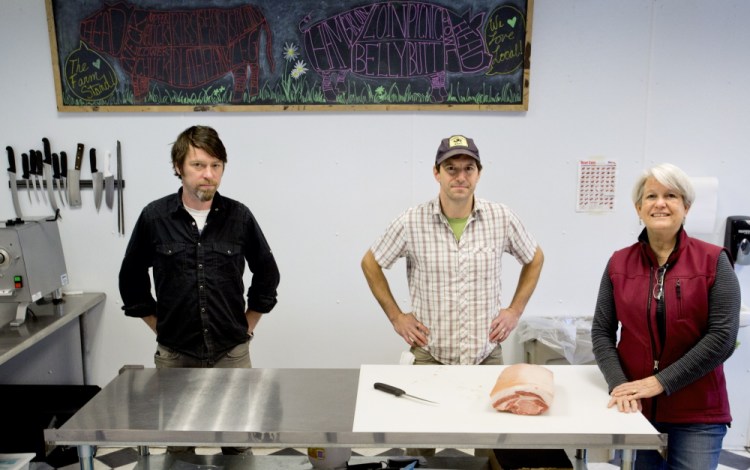Of human obligations, getting the groceries is one of the most mundane. You don’t text your friends to say “Going to the grocery store!” You make the list, pick the time when the grocery store won’t be too crowded and then fill your cart with items that have been shipped from all over the country – or the world.
But if you care about buying products grown and produced locally, a trip to The Farm Stand in South Portland is wildly exciting. Everything from the meat to the blueberries to the celeriac is 100 percent from Maine. It’s like a farmers market, but open at something closely approximating supermarket hours (9 am to 7 p.m. Monday through Saturday, 10 a.m. to 7 p.m. Sundays).
“Indispensable,” one nominator gushed of our winner for the Source Newcomer Award, for a business or entity established in the last 18 months. Another credited The Farm Stand, the brainchild of Penny Jordan and Ben Slayton of Farmers’ Gate butchery in Wales, with allowing them to “effortlessly integrate” the mission of eating local into their lives.
Which is really the point – take the excitement of the local food movement and make it so normal that soon it might be considered mundane to run down to the shopping center in South Portland to pick up Maine meats butchered by Slayton in Wales or vegetables grown by Penny Jordan’s fifth-generation family farm in Cape Elizabeth. Or a similar bricks and mortar store in Augusta, Brunswick, Kittery, Bangor or Houlton.
Insiders in the local food movement see this as the wave of the future, a collaborative effort that partners the likes of butchers, vegetable and fruit producers and cheesemongers under one roof.
“If you were going to look ahead for what is an emerging trend, I’d say keep your eyes on models like this,” said Marada Cook of Crown O’ Maine distributors.
Slayton approached Jordan about a shared business venture about five years ago. He had quickly made a name for himself at Farmer’s Gate and through regular Meat Up! events to buy locally grown meat (“If I could snatch him up I would,” Cook said). While his Wales location is ideal for interaction with his slaughterhouse and the farms where the animals were raised, he wanted to reach a broader audience. “Not that our customers don’t appreciate us, but we just don’t see enough of them,” Slayton said.
Meanwhile Jordan had been hoping to expand her family’s retail business in Cape Elizabeth (a popular farm stand open seasonally) to another location, but knew “we needed to offer something more than vegetables,” she said.
Slayton and Jordan “batted around” ideas, including one that would have pulled together different vendors under one roof, in booths, like a public market. But they began to see the drawback to the consumer in that; shuffling purses and wallets or writing checks at every stand. “We recognized that customers don’t care that we are two different businesses,” Slayton said.
They joined forces with Joe Fournier, whom Jordan knew as a purchaser with Rosemont Market who, like her, had long had a yen to open a retail shop in South Portland. “I told Joe, ‘That dream is mine and you can’t own it!’ ” Jordan said.
But Fournier could share it.
Jordan says local customers are grateful to have something of their own. “When we first opened we heard that continuously,” she said. ” ‘I don’t need to cross the bridge!’ ”
But the first eight months have been a lesson in having patience, Slayton said. A grocery routine is so ingrained that it takes a while for shoppers to embrace something new. “”We are still drawing people in,” he said. “But they haven’t quite figured out how to change their routines. Over time, word will spread. It just takes time.”
Not too much time though, if Jordan is to fulfill her next dream.
“I tease Joe and Ben that I want store number two before I am 65,” Jordan said. “And I just turned 62.”
Send questions/comments to the editors.



